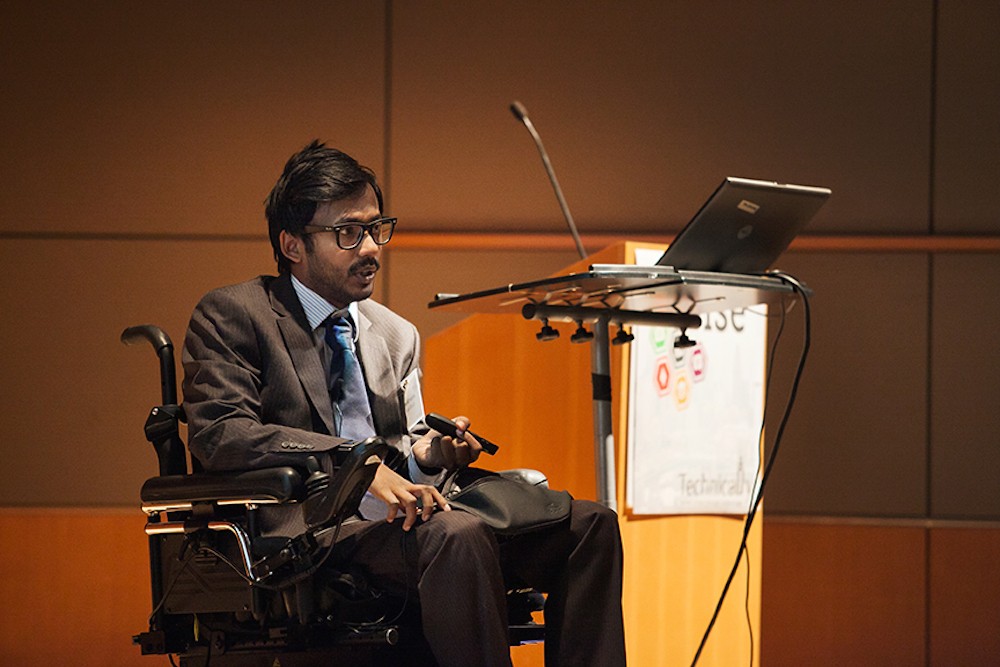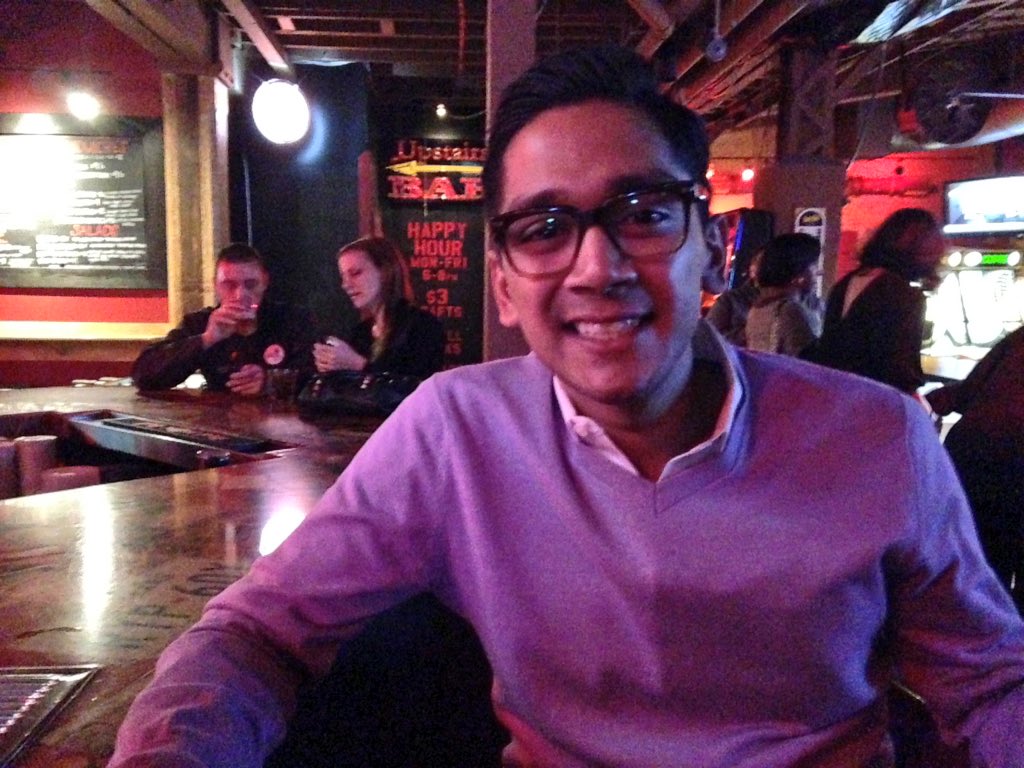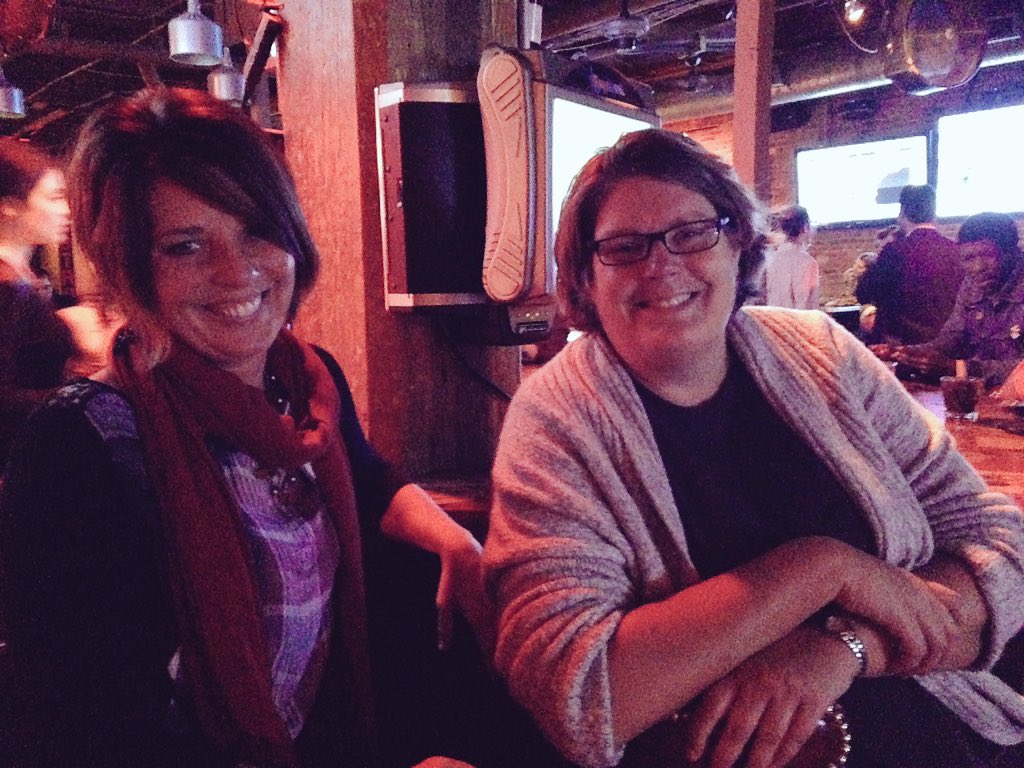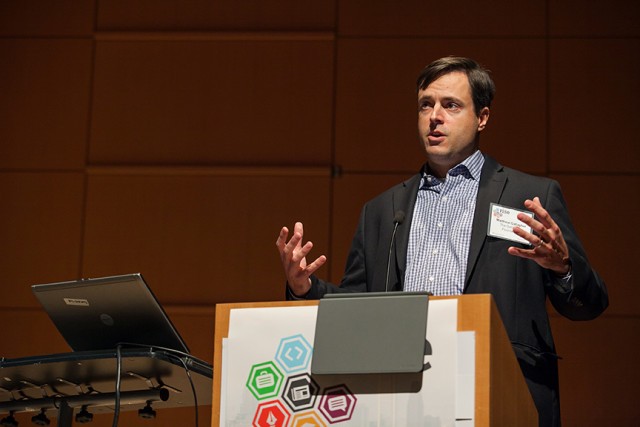When Martin O’Malley became Mayor of Baltimore back in 1999, he looked to other cities for good ideas.
O’Malley was a self-described “kleptocrat,” said Matthew Gallagher, O’Malley’s former chief of staff, at Technical.ly’s Rise Conference on civic innovation last week.
We need more "Kleptocrats": civil servants who steal great ideas from other places: @MDGBmore of @GoldsekerFdn #riseconf15
— Technical.ly (@Technical_ly) December 4, 2015
O’Malley, Gallagher said, wanted to steal as many good ideas as he could. Gallagher himself was a product of that practice — he came from Philadelphia Mayor Ed Rendell’s office.
In a way, Rise was a kleptocrat’s dream.
The second annual civic tech conference, featuring speakers and attendees from 10 different states and a keynote from Philadelphia Mayor-elect Jim Kenney, was the perfect place to steal ideas, and to get inspired about the future of cities.
Below, we recap some of our favorite takeaways, and hear from attendees about what they learned.
See slides from day 1 See slides from day 2Read about last year’s Rise here.

Cameron Miller. (Photo by Juliana Reyes)
Cameron Miller, who works at Penn’s Fels Institute of Government, came to Rise because he thought it’d be a good place to recruit students, but a lot of people came up to his table and told him: I don’t want another degree.
He especially liked the opening panel, moderated by Technical.ly Editor-in-Chief Zack Seward, on the future of cities because it covered so many different industries: big business, philanthropy and government. One that was missing? Academia. It made him think that he should get Fels professors on stage talking at civic tech events like this one.
And we're off! @daniellecohn @phillyluke @luliu @AlishaSlye kick off #riseconf15 with the future of city pic.twitter.com/1aG690E22v
— Generocity.org (@Generocity) December 3, 2015
Miller also gave Blackstone Launchpad’s Alisha Slye a shoutout for her “very direct and consistent” answers.

Technical.ly editorial director Christopher Wink and Mayor-elect Jim Kenney. (Photo by Chris Kendig)
During his keynote interview with Technical.ly Editorial Director Christopher Wink, mayor-elect Jim Kenney was a hit, garnering laughs and applause throughout his wide-ranging talk. He told candid stories of his South Philly childhood, did impersonations of Philly’s infamous Frank Rizzo and flexed his progressive muscle, touching on marijuana decriminalization, #BlackLivesMatter and immigrant rights. Read a lightly edited transcript of the interview here, plus our takeaways.
@JimFKenney just impersonated both Frank Rizzo and drunk millennials #riseconf15
— Generocity.org (@Generocity) December 3, 2015
Kenney also made a comment about how city governments have a hard time retaining tech talent that caused a bit of a stir with the City Hall tech talent in attendance.
“People who are really talented aren’t working for the government,” he said. “I don’t mean to denigrate the work of people in government, but if you’re looking for the top-notch IT people, the private sector sucks them up immediately and you can’t pay them.”
In another move that made him a fan favorite, Kenney also told the crowd to watch the legendary video where Rizzo lashes out at a local TV reporter.
PSA to #riseconf15: This is the video @JimFKenney wants you to watch about Frank Rizzo https://t.co/AZgp5D1U0y #crumbbum
— Juliana Reyes (@juliana_f_reyes) December 3, 2015

Courtney Minich. (Photo by Juliana Reyes)
“I’m sorry I speak so fast,” Courtney Minich says. “It’s a Philly habit.”
Minich, a project manager at a digital agency, lives in Manhattan but grew up in South Philly. She said Rise made her realize that tech isn’t just the domain of Silicon Valley — it actually cuts across many industries and cities.

Ather Sharif. (Photo by Chris Kendig)

Abhi Nemani. (Photo by Juliana Reyes)
When we find Abhi Nemani at the post-event happy hour, he’s getting teased relentlessly for dropping his Diet Coke on the stage during his talk. (The event’s host venue, the National Museum of American Jewish History, was very strict about allowing drinks into the theater.) For what it’s worth, Nemani, the former Chief Data Officer of Los Angeles, recovered well and kept on trucking with his talk, which we liked because of the way it spoke about technology in a human way. (He told us that’s because’s a liberal arts guy. He majored in philosophy, politics and economics at Claremont McKenna College.)
Technology, he said during his talk, is about empathy. Both for the consumer and the people on the back-end, like city staffers, who handle it.
Hacking Gov 1 Find allies 2 Simple is beautiful 3 Be the powerbroker. -@abhinemani #RiseConf15 TY @n_isama pic.twitter.com/Q2Ca7dS9zj
— Zachary Jeans ☁️ (@ZacharyJeans) December 4, 2015
Nemani, who’s now building a company in Chicago, told us that he’s been thinking about how cities can solve problems in a scalable way. Many cities struggle with the same problems, he said, like, say, fire department response times. Could a company build a scalable solution to that problem? Could a company “build it in a way that’s replicable from the start”?

Marybeth Becker (left) and Jackie Lightfield. (Photo by Juliana Reyes)
Maribeth Becker and Jackie Lightfield, who run placemaking and economic development organization Norwalk 2.0 in Norwalk, Conn., loved Seema Iyer’s talk about data and social justice.
Iyer, of the Baltimore Neighborhood Indicators Alliance, talked about how she’s using data to solve a problem like the education gap, talking about how the length of your commute is an indicator of your educational success, Becker and Lightfield said. In her talk, Iyer made data relatable.
“Data has this mystique about it,” Becker said. “People’s eyes glaze over. She broke that aversion down.”

Seema Iyer. (Photo by Chris Kendig)
Rise, Becker and Lightfield said, inspired them to make a dashboard for their mayor, like Nemani said he did, to see if other departments want to share their data and get on it.
“Even though Matt [Gallagher, formerly of the City of Baltimore] thinks dashboards are stupid,” Lightfield said, poking fun at Gallagher’s talk, where he said: “To hell with dashboards.” Dashboards, he said, are only useful if you have a steering wheel to go with it. In other words, data is just one part of the puzzle. Noted.
it's great to have a dashboard but you need a steering wheel to change direction too (like a car) @MDGBmore #riseconf15
— Sarah J (@johnsons531) December 4, 2015
It was Lightfield’s second time at Rise.

Matt Bailey. (Photo by Chris Kendig)
Matt Bailey, the Code for DC hacker who was named D.C.’s Director of Technology Innovation earlier this year, talked about civic hacking.
"Using technology should be joyful": @MattBailey0 says users of government websites should expect the same. #riseconf15
— Christopher Wink (@christopherwink) December 4, 2015
"Big screens are privilege": @MattBailey0 on government tech needing to be mobile ready to be accessible. #riseconf15
— Technical.ly (@Technical_ly) December 4, 2015
Eliza Pollack of the City of Philadelphia talked about building “an infrastructure of innovation,” for which the City of Philadelphia recently won a national award.
Our program manager, Eliza Pollack is discussing how we've built a capacity for innovation in city gov #riseconf15 pic.twitter.com/Jgs8idwxUk
— Innovation Lab (@PHLInnovation) December 4, 2015
Join the conversation!
Find news, events, jobs and people who share your interests on Technical.ly's open community Slack

Philly daily roundup: Earth Day glossary; Gen AI's energy cost; Biotech incubator in Horsham

Delaware daily roundup: Greentech terms to know post-Earth Day; generative AI's energy costs; anti-AI deepfake legislation

DC daily roundup: Washington Post's AI collab; a greentech glossary; Halcyon's debut Climate Fellowship cohort

